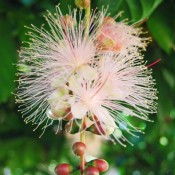
May 17, 2015 Hideaki Yoneda, correspondent of Ryukyu Shimpo
A Sagaribana tree, also known as Sawafuji (Barringtonia racemosa,) could be seen blossoming in Tokashiki Village on May 8. The tree has been growing there for a long time, alongside the Tokashiki River on the west side of the village, in the garden of 61-year-old resident Tsutomu Komine. The tree is said to be more than 400 years old.
It is the biggest of all the Sagaribana on the island and also has the most flowers. With roots spreading about 180 centimeters, its trunk is 65 centimeters in diameter and it’s about five meters high.
There used to be a cluster of big Sagaribana trees around the Tokashiki River near the current entrance to the forest road. Only about four trees are left today due to construction work around the river.
Komine is the seventh generation of his family to watch the tree come into bloom. As the tree is said to be 400 years old, the Sagaribana is considered to be part of the Komine family’s history.
The tree will be in full bloom around July and people can enjoy the sight of its petals floating from the river into the harbor.
(English translation by T&CT and Sayaka Sakuma)
Go to Japanese
May 22, 2015 Ryukyu Shimpo
The Okinawa Prefectural Government (OPG) announced on May 21 that they would add the names of 87 people who died in the war to the Cornerstone of Peace memorial. The memorial lists the victims of the Battle of Okinawa. All of those newly added came from Japan – 33 were from Okinawa while 54 were from outside the prefecture. Of these, 47 were from Gifu Prefecture.
According to the Gifu Prefectural Government, the family members of one of the bereaved who visited Okinawa last year, found that their father’s name was not inscribed on the memorial. They contacted the prefectural government, which discovered that the names of other war victims had also been omitted.
The OPG will also remove 32 names from the memorial. It is the highest number recorded since 2004. All of those whose names are to be removed were from outside Okinawa. Since its foundation, the custom has been for family members of the bereaved to ask the OPG to add a name to the memorial. However, there have been many cases where a name was added more than once and had to be removed later.
With the newly added victims, the total number of names inscribed on the memorial has reached 241,336. Of those, 149,362 were from Okinawa, while 77,402 were from outside the prefecture and 14,572 were from other countries. The policy of the memorial is to inscribe the names of war victims based on requests from family members of the bereaved.
(English translation by T&CT)
Go to Japanese
May 20, 2015 Ryukyu Shimpo
Okinawa Prefecture aims to attract 7.6 million tourists in fiscal 2015, up about 6% from last year, the prefectural government (OPG) said on May 19. The OPG made the announcement as it unveiled part of its “Visit Okinawa” tourism project for the year that runs through March 31, 2016.
Of the target figure, foreign tourists constitute 1.2 million, an increase of about 21% on the 980,000 who visited Okinawa last year. The target was originally set for fiscal 2016 under the plan, “Okinawa 21st Century Vision,” but the prefecture aims to achieve it a year earlier.
In order to achieve the goal, the OPG will strengthen tourism promotion activities both inside and outside Japan. It will also implement policies to promote tourism in its remote islands, train personnel for the travel industry, and enhance the hospitality infrastructure for visitors.
“We want to actively woo tourists from Singapore, where a new office is set to open in July. It will be one of the main hubs of our activities,” said Mitsuyuki Maeda of the tourism and sports promotion division of the prefectural government.
“We aim to steadily increase the number of domestic tourists we attract. We want to thoroughly implement programs including the ‘Shunka Shuto’ campaign that presents the beauty of the islands in different seasons,” he said.
The OPG expects to see up to 9.5 million domestic airline seats and 1.3-1.4 million international seats made available for travelers visiting Okinawa during fiscal 2015, about the same level as last year. Cruise ships are expected to make a total of 203 stops in Okinawa this year, 41 more than in 2014.
(English translation by T&CT and Miwa Murphy)
Go to Japanese
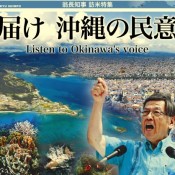
May 25, 2015 Ryukyu Shimpo By Hideki Matsudo
The Okinawa Governor Takeshi Onaga will visit the United States from May 27 to June 5 to block a new U.S. military base from being built in Henoko, Nago. In Washington D.C., he will meet U.S. officials. The Governor will request that the U.S. government, which has left Okinawa with the excessive burden of hosting the bulk of Japan’s U.S. bases for 70 years after the war and is potentially introducing an additional burden to the island, to give up the current building plan.
The Nago Mayor Susumu Inamine will accompany the Governor. This is the first time a Governor of Okinawa and a Mayor of Nago have visited Washington together to appeal directly to US leaders since 1996, when the Government of Japan and the U.S. agreed to close and relocate Futenma Air Station to Nago.
On May 17, at a protest rally that drew a massive turnout of about 35,000 people, Governor Onaga, who won the gubernatorial election in November 2014 with overwhelming public support, declared, “As a governor in receipt of the mandate given by the citizens of Okinawa, I will use every possible means to block the base from being built.” Washington and Tokyo are steadily pushing forward with the work in Henoko irrespective of Okinawan public opinion, which is giving rise to a mood of revolt among citizens.
The Government of Japan has said the current plan to relocate the base to Henoko is the only realistic option. However, Governor Onaga rebutted this while making a speech at the Foreign Press Club in Tokyo, saying; “I fully understand (the importance) of the Japan-U.S. alliance. If there is an accident in Futenma after Tokyo fails to build the new base in Henoko, the security system between the United States and Japan may in fact prove nothing more than a house of cards. ” He implied that the current plan will come to a deadlock and warned the U.S. and Japan not to continue putting Okinawan lives in danger.
The former Governor Hirokazu Nakaima met Assistant Secretary of State Kurt Campbell and Assistant Secretary of Defense Mark Lippert at the State Department in October 2012 and appealed to them to relocate Futenma outside of Okinawa. However, the U.S. side did not change its stance. Since then, opposition to the Henoko base plan has increased. As a key step in stopping the new base’s construction, Governor Onaga plans to bring the Okinawan voice to the center of U.S. government and draw international attention to the unprecedented level of public opposition.
(This article edited by Jane Close and T&CT)
Voices from Okinawa
The military that threatens the dignity of women
 Harumi Miyagi, historian on women’s issues in Okinawa
Harumi Miyagi, historian on women’s issues in Okinawa
About 15 years ago, I had the opportunity to speak about U.S. military base issues in Okinawa to a group of American students in Washington DC. One of the students said, “The U.S. forces are stationed there to protect the Japanese. There is no way that the military has caused troubles. Rather, the Japanese have done terrible things to the Asians. The issue of ‘comfort women’ has not been resolved yet also.” Other students raised a similar voice.
Once again, I’d like to state the following.
First of all, please acknowledge the fact that the armed forces of your country have continued to stay in Okinawa for 70 years and have caused a countless number of incidents and accidents. The U.S. military has looked down upon the local Okinawans as “gooks (Asians)” and has been allowed to do whatever they want in Okinawa, which they regard as their war trophy.
Since the armed forces landed on Okinawa in 1945, a countless number of women, including a nine-month old infant, have been deprived of their human dignity at the demonic hands of your military. Furthermore, most perpetrators have continued to lead a normal life without being punished for their acts. For women, Okinawa is not yet in a “post-war” era as long as the armed forces of your country continue to be stationed on the island.
The Pentagon said on May 1 that an estimated 18,900 service members were subjected to some kind of unwanted sexual contact in fiscal 2014. The residents of Okinawa know that it is a structural problem with the military, that the stress of continuing to train for killing people will find an outlet on the weak members of society.
For sure, the historical recognition of the Japanese government is also unacceptable to the Okinawans, who have experienced the Battle of Okinawa firsthand. But please note that many members of Japanese civic groups have been working with the people of Asia to expose aggressions committed by the imperial Japanese military and have been continuing movements to teach accurate history. To the citizens of the United States, I urge you not to be swayed by the government’s policies, but instead, recognize how much your armed forces are detested by residents of other countries and start a movement to bring the military stationed in Okinawa back to your own country.
Canceling construction of a new base is not unreasonable
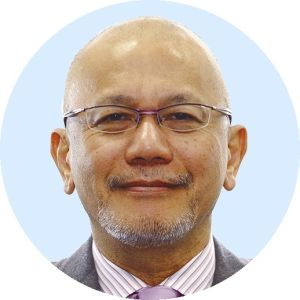 Masaaki Gabe, professor at the University of the Ryukyus
Masaaki Gabe, professor at the University of the Ryukyus
It is a reasonable decision for the U.S. Government to cancel construction of the new base at Henoko, Nago. The Okinawan people have adamantly rejected the relocation plan and so the United States should encourage the Japanese government to give up its construction plan.
The main purpose of Governor Takeshi Onaga’s visit to the United States is to gain more understanding about Okinawa by explaining Okinawa’s current situation 70 years after world war II from the standpoints of rights and justice. The governor’s claim is not contrary to the interests and principles of the United States.
The Majority of Okinawan people do not think it is still necessary to maintain giant U.S. military bases. They think it is possible to realize a large-scale reductions of the U.S. Marine s in Okinawa.
During the 20th century, the United States had extraordinary military power and mobility, which made it easy to deploy its forces outside U.S. mainland. With the growth of China’s military after 2010, Okinawa is within the range of China’s short and long-range missiles.
U.S. military ground installations have become the potential target of Chinese missiles. The United States is losing its superiority in its capability to deploy forces – its superiority is limited.
The need for land-based U.S. Marines has becomes less necessary. China’s military capability on and below the sea is a threat to the U.S. aircraft carrier group. The first priority for the U.S. forces is to develop its ability to pursue Chinese submarines.
It is paramount importance for the United States to avoid an armed conflict with China in the South China Sea and the East China Sea. If an armed conflict were to occur, it would be helpful for the United States to pursue a diplomatic solution to tensions, while taking measures to prevent an escalation of the conflict. With particular regard to involving China in the region, the U.S. Marines are not expected to play a significant role. It would be sufficient to deploy at most 100 personnel to inspect unidentified ships.
The possibility that an armed conflict could break out between Japan and China is more likely than between the United States and China in a territorial dispute over the Senkaku Islands. If that were to happen, the United States should play the role of easing tensions. Even after moving the Marines to Guam and Hawaii, the sprawling Kadena base will remain in Okinawa.
The U.S. hedge strategy to manage potential threats from China would be most effective by using the U.S. Naval forces home-based in Japan and its air forces at Kadena Air Base.
Gov. Onaga should exercise Okinawa’s right to self-determination
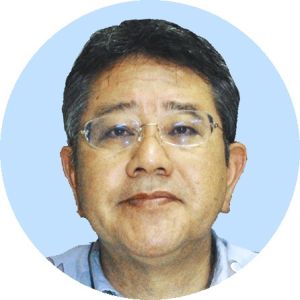 Jun Shimabukuro, professor at the University of the Ryukyus
Jun Shimabukuro, professor at the University of the Ryukyus
Governor Takeshi Onaga will urge the United States to stop building the new base in Henoko and allow Okinawans to exercise their right to self-determination. In response to the action to be taken by Governor Onaga, these are some of the key stances of the U.S. government;
(1)The governments of Japan and the United States will go ahead with the plans involving U.S. base in Okinawa by their negotiations on the agreement between them. (They allege that Okinawa has not the right to negotiate with the U.S. government about anything regarding the relocation plan.)
(2) The U.S. government says it is prepared to consider alternative proposals from the Japanese government regarding the realignment of U.S. forces in Japan, including the Henoko plan. (The U.S. government is fully aware that Japan will not offer alternative solutions because Japan is a “vassal state of the U.S.”)
(3) The U.S. government has received the explanation from the Japanese government regarding this matter, that the work in Henoko is carried out legally, based on appropriate procedure, including the former governor’s approval of the landfill. (The U.S. government has no doubts the procedure was just formality and went far beyond practical reign of law.)
The U.S. government is expected to tell Governor Onaga that the Henoko base was given the go ahead after the Okinawan administration approved the landfill, and regarding domestic politics, including the political process that led to the former governor’s approval, it will urge Onaga to appeal to the Japanese government rather than the U.S. government. It will stress that negotiation must go through the Japanese government, not directly between Okinawa and the U.S. government.
However, the U.S. government and U.S. residents must learn that Okinawa-U.S. relations have a long history.
The United States made a pact with Okinawa when the prefecture was its own independent kingdom, the Ryukyu Dynasty. Following the battle of Okinawa, the U.S. took over administration of Ryukyu from the Japanese government. Okinawa has a right to self-determination under international human rights law, certified by the United Nations. Thus it is illegal for the U.S. and Japan to exclude Okinawa from decisions about its future. The US government must recognize Okinawa’s rights and the Japanese government should make proposals to the U.S. government only after it has had proper democratic discussions and agreements with Okinawa. They must respect Okinawan public opinion. Finally, it must be known that the former Okinawan Governor approved the landfill in a total betrayal of his election campaign pledge, and of the Okinawan people. The former governor failed to win support in the following election, in which the Henoko relocation was the key issue for voters. The Okinawan public has demonstrated its democratic will, which is to stop Henoko. The former Governor’s approval of the Henoko relocation violated Okinawa’s right to self-determination.
Okinawa is shaking the foundations of the US-Japan alliance
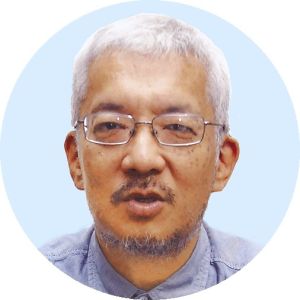 Manabu Satou ,Professor at the Okinawa international university
Manabu Satou ,Professor at the Okinawa international university
Last November, in a gubernatorial election that was widely viewed as a referendum on the construction of a new US Marine Corps base in Henoko, Okinawans , elected current governor Takeshi Onaga by an overwhelming margin. In December’s Lower House elections, anti-Henoko “All Okinawa” candidates swept all four of Okinawa’s districts, defeating pro-base LDP incumbents. And in Nago city, where Henoko is located, last year’s mayoral and city council elections were won by anti-Henoko candidates. As self-proclaimed champions of democratic ideals, the American people must be informed that Governor Onaga’s plea to stop the construction of the new base at Henoko has clear and overwhelming democratic legitimacy- it is his electoral mandate. To ignore the popular will of the Okinawan people and push forward the construction by force will definitely and irreparably damage the US’s moral standing in international society.
It seems that both President Obama and Congress have welcomed Prime Minister Abe’s policy offerings, such as widely expanding the role of Japan’s Self Defense Forces and pushing forward construction at Henoko, because of the short term relief they would provide the US. But does the US government understand what Japanese society would expect from a new base in Henoko and the continued presence of the US Marine Corps in Okinawa? For the Japanese, a new base at Henoko is seen as a base for direct US military operations against China in the Senkaku Islands. Should the US avoid such a military conflict with China, Japan- and other allies- would drift away from the US. To force the construction of the base at Henoko would force the US into a difficult situation.
Further, Prime Minister Abe seems to have decided that the US accepting his offering of Henoko means that the US also accepts his historical revisionism. The US will end up trading its long-term, post-war status as leader of the free world for the short term and insubstantial advantages that the base at Henoko might bring.
Governor Onaga was an influential member of the LDP and is a conservative politician. Even now, he supports the US-Japan Security Treaty, and only wants to stop the construction of the new base at Henoko. He has continuously accepted the presence Kadena Airbase, which far more important strategically than Henoko or Futenma to the US. Americans should think hard about what it means for such a conservative politician to stand at the forefront of the anti-Henoko movement. Okinawa’s political situation has the very real potential of shaking the foundations of the US-Japan alliance.
Stop the construction of the base at Henoko.
May 25, 2015 Ryukyu Shimpo special edition of the Gov. Onaga’s visit to the U.S.
One in four people killed in the Battle of Okinawa
 Chihiro Uchimura, director of Fukutsu-Kan, museum of Kamejiro Senaga and the people’s history
Chihiro Uchimura, director of Fukutsu-Kan, museum of Kamejiro Senaga and the people’s history
I am so glad that Governor Onaga is expressing his objection to the new base being built in Henoko based on the historical situation forced upon Okinawa. One in four inhabitants of Okinawa prefecture were killed in the battle of Okinawa in World War II. After the war, Okinawa was separated from Japan and placed under American military rule for 17 years. During that time quite a few residents were killed in U.S. military aircraft accidents, as well as raped by military personnel. Every time people in Okinawa were treated unfairly and denied any shred of democracy, we united and were victorious. Even after Okinawa was returned to Japan in 1972, we keep suffering due do the base problems. In the U.S. there must be a lot of people who don’t even know where Okinawa is, but I believe when Americans hear about the history of Okinawa, the present situation in Henoko, and the opposition of the Okinawan people toward the new base, they will have no choice but to take action.
We want an Okinawa where women and children can live without fear
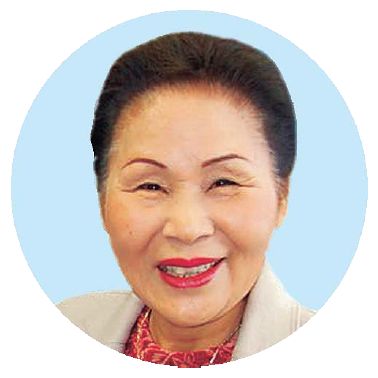 Kiku Taira, chair of the Okinawa Prefecture Women’s Association
Kiku Taira, chair of the Okinawa Prefecture Women’s Association
The people of Okinawa are strongly opposed to the construction of a new base. We hope that Governor Takeshi Onaga will convey our feelings strongly to the U.S. government during his visit to the U.S. We also hope U.S. citizens learn about Okinawa. And we want the Japanese government not to just give us explanations that are only words, but to actually consider the situation. Removal of Futenma Air Station, which is said to be the most dangerous base in the world, is our wish. The U.S. and Japanese governments have forced Okinawa to sacrifice itself for the sake of the U.S. bases for 70 years since the end of the war. We want to ask why only Okinawa bears the burden of so many bases for the peace of all of Japan. We also worry that a dangerous airplane is flying in the skies over Okinawa. This aircraft just had an accident in Hawaii in May. We can’t feel peace of mind living under the skies where that aircrafts flies. We want an Okinawa where women and children live without any fear. We hope that Governor Onaga conveys our will to the U.S. government.
Governor intends to prevent construction of a new base
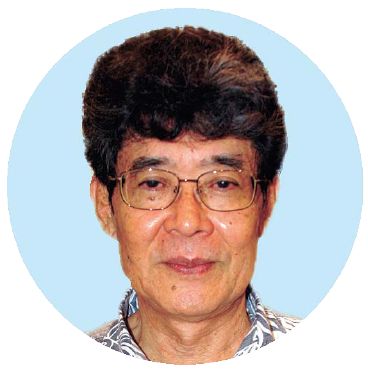 Eiki Matayoshi, Akutagawa Prize-winning writer
Eiki Matayoshi, Akutagawa Prize-winning writer
In the Ryukyu Kingdom, the “omotenashi” spirit of hospitality is strong. However, when someone abuses this hospitality and takes advantage of it, we must give a strong warning to them not to disrespect us. We say “usheruna” in the Ryukyu language, which means, “Don’t treat us like fools.” I hope that Governor Onaga gives a firm warning to the U.S. government. In the past, strong countries such as the United Kingdom and the Netherlands treated the people in their colonies as resources. There may be a fundamental belief in the governments of both Japan and the United States that Okinawa just exists for their own profit. Governor Onaga is serious about preventing the construction of the new base. People in Okinawa are serious too. I hope Governor Onaga conveys Okinawan sentiment to U.S. government and makes himself heard.
A new base will increase risks to businesses
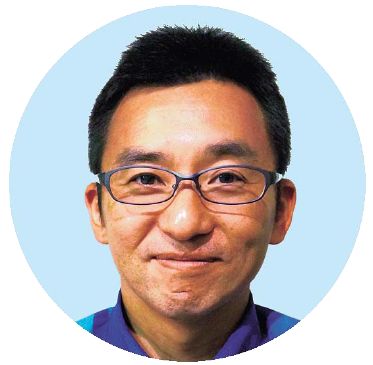 Shuji Suzuki, president of Yuimaru Okinawa Inc.
Shuji Suzuki, president of Yuimaru Okinawa Inc.
We do not need U.S. military bases anymore in Okinawa. After 9/11, it is said that Okinawa has become dangerous because it contains U.S. bases. Earnings from our businesses have decreased, as well as the number of tourists. This proves that tourism and militarism cannot coexist. We already have risks that make it difficult for us to be a popular island for tourism. Constructing U.S. bases only increases safety risks. In Okinawa, companies need to get together and express our opinions. Many Okinawan people support Governor Onaga.
Public opinion polls show that more than half of Japanese citizens oppose the construction of a new U.S. base. We want the U.S. to listen to the people, not only to the Prime Minister.
Governor’s visit to the U.S. will create a new development
 Yoshimi Teruya, former chairman of the Okinawa Prefectural Union of Chamber of Commerce and co-leader of the executive committee
Yoshimi Teruya, former chairman of the Okinawa Prefectural Union of Chamber of Commerce and co-leader of the executive committee
I have reiterated that the Japanese media is largely responsible for the fact that Japanese citizens do not understand the issues in Okinawa. Recent polls and surveys have shown that opposition to relocating the U.S. military base to Henoko is increasing. Governor Onaga has played a role in bringing about this shift. Since his inauguration, he has stood firm in his policy of not allowing new U.S. bases to be constructed. He will visit the U.S. and share this message, hoping to draw the attention of the U.S. media in an attempt to spread knowledge of this issue to American citizens.
Change Japan through the United States
 Seigen Miyasato, political scholar and advisor to the Okinawa External Affairs Study Group
Seigen Miyasato, political scholar and advisor to the Okinawa External Affairs Study Group
Okinawa Governor Takeshi Onaga should actively convey Okinawan sentiment through a variety of channels, including the U.S. Congress and government, to appeal to public opinion.
The Japanese government’s argument that there is no alternative but relocation to Henoko in order to achieve the return of the Marine Corps Air Station Futenma is just an excuse. The Japanese government is easy to work with for the U.S. government because the Japanese government listens to whatever the U.S. government says. Japan needs to change by speaking up to the U.S. The U.S. will not take action unless Japan does. It makes perfect sense for the governor of Okinawa to use history as a basis on which to condemn the overwhelming burden of U.S. bases in Okinawa.
Japan sacrificed Okinawa in order to sign the U.S.-Japan Security Treaty. We must express the same idea in a straightforward manner over and over again as many times as necessary.
Onaga should confidently voice objection to U.S. base
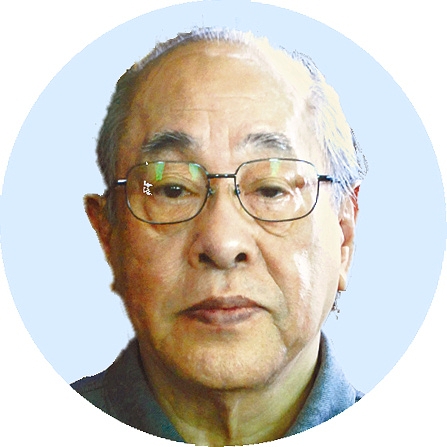 Masanori Yoshimoto, former Vice Governor
Masanori Yoshimoto, former Vice Governor
The former Ota administration of Okinawa prefecture also wanted to establish an office in Washington, but this idea was not realized because the prefectural assembly did not accept it. The role of a local office is huge, and the exchange of information that has occurred there so far will be beneficial for Onaga’s U.S. visit. Additionally, support from both conservatives and progressives, as well as from the business world, played a big role in the emergence of Governor Onaga. Governor Onaga should be confident as a representative of Okinawa as a whole. He should make clear that this problem cannot be resolved through negotiations with the Japanese government, and he should advocate that the Marine Corps Air Station Futenma needs to be shut down, and that building a new base in Henoko is not an option. Furthermore, he should meet with intellectuals to raise interest regarding the Okinawa issue in the U.S.
Uchinaguchi and rock-paper-scissors
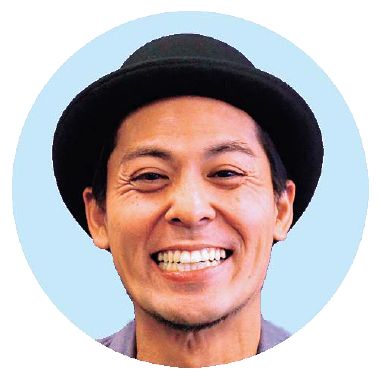 Masamitsu Kohatsu, Comedian
Masamitsu Kohatsu, Comedian
I want Governor Onaga to tell Obama “Uchinanchu ushete naibirando (Don’t look down on Okinawan people)”. He spoke these words in Okinawan language at a recent prefectural rally. It is a mark of distinction that Onaga speaks the Okinawan language, so I think if he uses these words he will attract more attention to his cause, even if the words are rare and unfamiliar to most people. These words will trigger emotions. The representatives of the 47 prefectures in Japan should decide on an alternative relocation site for the Futenma air base by playing rock-paper-scissors. If they did that, the whole nation would think of this problem as their own problem. This would also draw attention to Okinawa.
Speak directly to people in the U.S.
 Mitsuko Toumon, former Okinawa City Mayor
Mitsuko Toumon, former Okinawa City Mayor
Governor Onaga is doing very well after being elected. There is a lot of popular support for Onaga among Okinawan citizens, who appreciate his efforts to shape Okinawa’s future for the better and voice their opposition to the Henoko base.
The American public remains largely ignorant about Okinawa, but there are people within U.S. think tanks and government who understand and sympathize with Okinawa. To inform more people about Okinawa, and increase their willingness to understand, it is important that Onaga himself goes to the U.S. and speaks clearly and directly about what Okinawan citizens think. In the U.S., if you do not convey things clearly, people will not understand what you are trying to say. So I want Onaga to speak as directly to people in the U.S. as he has to the Japanese government.
Protest in Henoko sends message of peace to neighboring countries
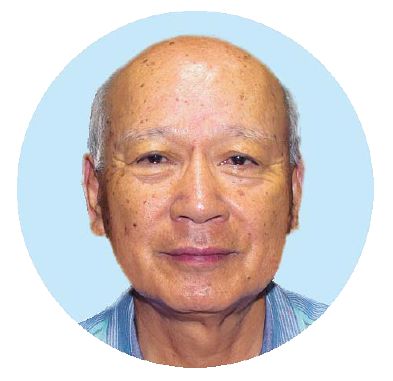 Yotake Kedashiro, chair of the Senkaku Islands Missing-War-Bereaved Association
Yotake Kedashiro, chair of the Senkaku Islands Missing-War-Bereaved Association
The Okinawan people’s struggle against the Futenma relocation plan and the landfill works in Henoko is one for sovereignty and democracy. About 35,000 people clearly showed their opposition to the relocation at a rally held recently. Some people have accepted the U.S. base against their will. The governments of Japan and the United States may lose support if they go ahead with the Henoko relocation. We will lose our dignity if we will allow the new base to be built. We would like Governor Onaga to bring his strong message to the United States. Some people think the relocation plan is necessary because China poses a threat. However, it is unrealistic to expect armed conflict will break out near the Senkaku Islands. The Okinawan people have chosen a peaceful solution and are sending a clear message to neighboring countries that they want to ease tensions by reducing the military presence.
US government is the real stakeholder in this issue
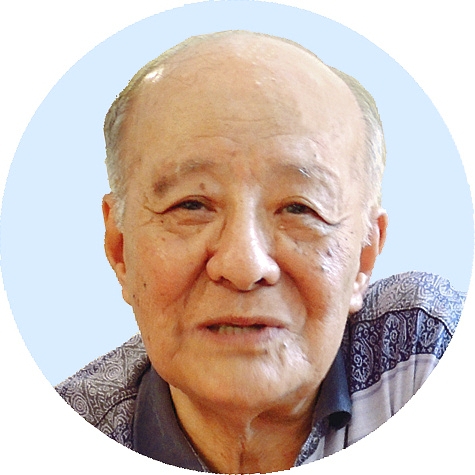 Mikio Higa, former vice governor of the Okinawa Prefectural Government
Mikio Higa, former vice governor of the Okinawa Prefectural Government
I expect Governor Onaga to adamantly oppose this discrimination against the Okinawan people who have been forced to sacrifice so much. Building a new base at Henoko makes no sense from a military, a business, a societal, a cultural or an environmental viewpoint. The vast majority of Okinawan people are opposed to the Henoko relocation. The governor should urge the U.S. government to abandon its plan. In addition, the governor should tell the U.S. government that it cannot maintain its military presence surrounded by hostility. The governor should tell them that the U.S. government is the real stakeholder in this issue. The U.S. government should respond to the request from the governor.
Governor’s words have more impact
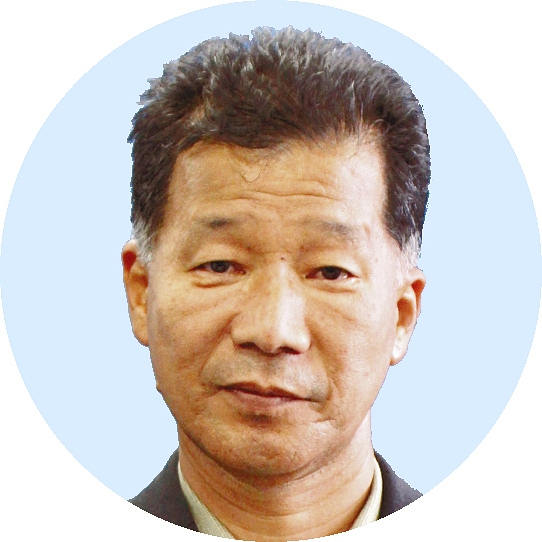 Tadashi Oshiro, the president of Itosan
Tadashi Oshiro, the president of Itosan
Governor Onaga’s visit to the United States has an important significance for Okinawa. Words from the governor’s own mouth will have more impact in the United States than anything we can say. The U.S. military bases have been concentrated in Okinawa since the war ended. I strongly request the governor to tell U.S. Congress members and ordinary U.S. citizens about the current situation in Okinawa. Because of U.S. military training, access to the sea is restricted in many areas, just as it is restricted to many places on land. We would like him to argue for a reduction in these sea training areas to promote the economic independence of fishermen.
Please respect the History of the Ryukyu Kingdom
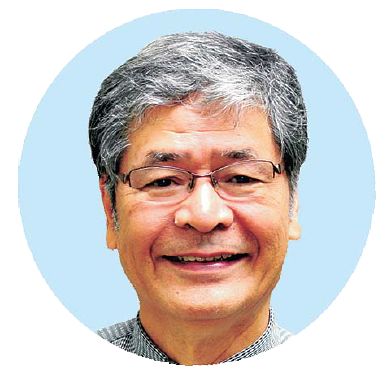 Michio Sakima, director of the Sakima Art Museum
Michio Sakima, director of the Sakima Art Museum
During the Ryukyu Dynasty, Okinawa kept peaceful relations with other East Asian countries under the Sakuho System. That history of friendship and trust lives on in the memory of the peoples of those Asian countries today. We will oppose the placing of military bases in Okinawa to prepare for war. The U.S. government should respect the History of Ryukyus. The United States is losing its power in East Asia while China’s is growing. We stand at a major turning point of history. Nevertheless, the Japanese government clings to its great dependency on the U.S. military. Today it is an anachronism to strengthen military alliances. The governments of Japan and the United States should use peaceful diplomacy to resolve disputes, not military power. They should learn about peace and diplomacy from the history of the Ryukyu Kingdom.
We will create a more peaceful Okinawa if we resolve the base issue
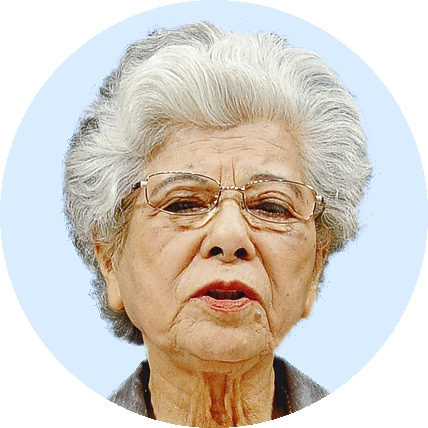 Keiko Taira, survivor of the Tsushima-maru, the ship sunk by a U.S. submarine in 1944
Keiko Taira, survivor of the Tsushima-maru, the ship sunk by a U.S. submarine in 1944
Since World War Two, Okinawa has been forced to bear the burden of U.S. bases for 70 years. However, we shall overcome no matter what. Governor Onaga says, “I will visit many times, if the situation calls for it.” So to support the governor’s action, I will not give up the fight for real democracy either. The Postwar period has not yet come to Okinawa. We waved off our friends, classmates and teachers just over 70 years ago. Now, they sleep at the bottom of the sea. However, the Japanese government has started to walk towards war. I am so angry that I want to run away to the other world. I would like to see a more peaceful world by resolving the base issue. Bases lead to war. I hope we will have no more bases. I would like many people to make use of the Henoko fund to tell the world about Okinawa.
Respect Okinawa’s right to self determination
 Satoshi Toyama, the chairman of Okinawa Hotel Association
Satoshi Toyama, the chairman of Okinawa Hotel Association
In the Japan-U.S. Summit meeting the Japanese government again said,” the construction of a new U.S. base in Henoko in Nago is the only solution.” Now is the time to claim Okinawa’s right to self-determination. As the U.S. is part of Japan’s Security Arrangements, I believe that Mr. Onaga will ask what should happen the U.S. bases and how the Japan-U.S. Security Treaty can give dignity to the people of Okinawa. Real dignity could be achieved by respecting Okinawa’s right to self- determination. I am proud as an Okinawan citizen that Mr.Onaga will convey our requests concerning Okinawa’s future directly to the U.S. people and their government.
US should listen to the will of the Okinawan people
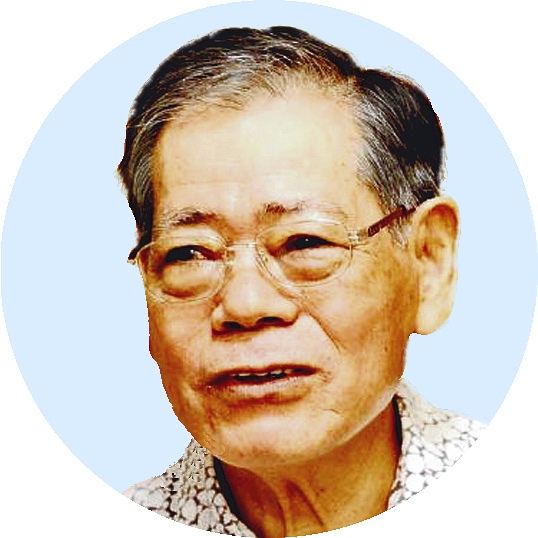 Sojun Taira, the chairperson of History Educationalist Conference of Okinawa
Sojun Taira, the chairperson of History Educationalist Conference of Okinawa
If the United States government is proud to call America the land of liberty and equality, it should listen to the will of the Okinawan people. No matter what you think about it, it is unnatural that 74 percent of U.S. military facilities in Japan are concentrated on these small islands, which comprise just 0.6 percent of Japan’s total land area. Despite the over-concentration of bases in Okinawa, the governments are now intent on building a new base here. We cannot accept it.
They say the construction plan is based on a bilateral agreement between the governments of Japan and the United States. They decided that agreement without listening to us. The majority of voters in Okinawa elected Onaga as the prefecture’s Governor by the large margin of 100,000 votes in the last year’s election. Considering this situation, the U.S. government should work to reduce its bases in Okinawa.
May 25, 2015 Ryukyu Shimpo
It has been necessary for Governors of Okinawa on a frequent basis to visit the United States. There are no other prefectures in this country enduring such hardships as are imposed on ours. Okinawa Governor Takeshi Onaga will travel to the United States today.
The four most recent former governors have also visited the United States. It was because they had no other direct way of conveying overwhelming Okinawan majority feeling to the American people than by going there. Tokyo lacks the political will to listen to the wishes of the people. We believe the government discriminates against Okinawa.
The recent political situation has changed dramatically in Okinawa. All the candidates opposing the new base construction have won their recent election campaigns. They were victorious in the Nago mayoral election, and at the end of last year in the gubernatorial race and the House of Representatives elections. Furthermore, mass rallies have attracted vast numbers. The people have demonstrated their will by using every means available in the democratic process. While in the U.S., Governor Onaga should declare his determination to block the new U.S. base, and show clear pride in the massive public support backing him.
Washington’s clear violation of the Hague Convention
It falls to us to point out that the governments of the United States and Japan take a non-humanitarian approach to maintaining the presence of the U.S. military in Okinawa.
At the end of World War II, the U.S. military seized land for its bases while most residents were being encouraged to surrender and were then held in internment camps. In the 1950s, it deprived local people of their homes and farmlands in order to expand their bases – often at bayonet point. Those actions violated Article 46 of the Hague Conventions, an international agreement forbidding the confiscation of private property by any occupying power. Now Tokyo and Washington are trying to build their new installation in Henoko, Nago. That measure is being enforced against the clear will of the people. Washington and its military machine have placed Okinawans – in their own homeland – in such circumstances by having violated international law over a period of 70 years, that is since the end of the war. And it will continue to do the same into the foreseeable future.
Tokyo and Washington state that the U.S. Marine Corps Air Station at Futenma will remain in Ginowan if resistance to its replacement facility at Henoko persists. From the start, they deprived us of the lands on which the bases were built. Once a base seems to be inoperable, they demand that we provide a new one. It is too obviously unjust and inhuman that they threaten us with the aim of our allowing a new base.
Washington and Tokyo are unable to maintain freedom, equality, human rights and democracy in Okinawa. We wonder whether those two states subscribe to the practice of disseminating universal values worldwide. That situation is nothing short of a mystery.
Some people say that the Okinawan economy depends on benefits derived from the U.S. military facilities. That is a huge misconception: rather the bases serve as a disincentive to growth within the Okinawan economy. Prosperity could develop quite dramatically if the bases were closed. Many examples and much data prove that.
Then there are others who say that if the U.S. Marines were transferred from Okinawa to the main islands of Japan, or the United States or Australia, their capabilities would be diminished. No one in the United States, though, accepts that notion. Experts on security affairs in America also advocate the transfer of the Marines from Okinawa to Australia.
Thus circulate such myths – that transferring U.S. bases beyond the prefecture could ravage the Okinawan economy, and that Japan would lose its deterrent endowment. Those particular myths, though, have already been dispatched.
“I would like Okinawa to become a buffer zone for peace,” Onaga told the overseas press corps in Japan. What is more, there is a view that Okinawa can grow with the assistance of developing Asian countries. Okinawa already has a vision of the future following the removal of a large portion of the U.S. military bases.
Washington amplification
There is a process known as “Washington amplification,” coined by Sayo Saruta, the director of Tokyo-based think tank New Diplomacy Initiative.
To illustrate the phenomenon, some Japanese politicians and ministerial mandarins identify certain political goals that will ultimately yield their objectives. However, those goals happen to be unpopular among a majority of the Japanese people. Therefore, they pitch their agenda items at a mere 30 or so American members of Japan specialist groups, but mainly at five or six Japan policy specialists in Washington D.C. Among them are such major figures as former Deputy Secretary of State Richard Armitage and former Senior Director for Asian affairs at the National Security Council Michael Green. Such Japan policy specialists express the objectives in question as their own views. Even though a majority of Americans know little about those policies, they come to be mentioned in terms of their being “what Washington wants.” As a result, Tokyo-originated political goals are achieved.
The so-called “Japan-U.S. Security Arrangements (Anpo) mafia” members, certain Japanese politicians and Foreign and Defense Ministry bureaucrats in favor of maintaining US bases in Okinawa, frequently resort to such tactics to achieve their objectives. We have been swayed by those amplified remarks over a long period, too long a period.
The method is sometimes used to silence opposition. The Anpo mafia members label the Okinawan movement opposed to the construction of the new military base as being a maneuver to extract funding and subsidies. The result is that opposition voices are discounted or discredited and thus dismissed. Former director of the State Department’s Office of Japan Affairs Kevin Maher claimed, “Okinawans are masters of manipulation and extortion from Tokyo.” That is a good example of Washington amplification.
The reason why Governor Onaga has to visit the United States is that Okinawa needs to counter that formidably dense barrier. It will not be easy. However, we would like to hear Governor Onaga’s persistently proclaiming, “I have an unflagging resolve to halt the construction of the new base. I require the U.S. government to return Futenma Air Station to Okinawa swiftly, and redeploy the Marines beyond Okinawa and Japan.”
(English translation by A.P. Jenkins and T&CT)
Go to Japanese
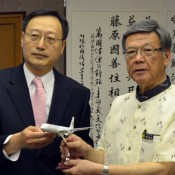
May 16, 2015 Ryukyu Shimpo
China Eastern Airlines will launch a direct service between Naha and Fuzhou starting in July, Chinese Consul General to Fukuoka, Li Tianran, said May 15 when he paid a visit to Okinawa Governor Takeshi Onaga at the prefectural government office.
The carrier plans to operate the twice-weekly service with a plane capable of carrying about 180 passengers, Li said, adding that the plan was formalized on May 14.
The service will link Naha Airport and Fuzhou Changle International Airport on Wednesdays and Saturdays. A departure ceremony will be held on July 1 at the international terminal of Naha Airport.
Depending on the popularity of the service, the airline may consider increasing the number of flights or introducing a bigger-capacity plane, Li said.
“We want also want to increase the number of cruise ships sailing between Okinawa and Fuzhou,” Li told Onaga. “We want to further promote our exchange and deepen our mutual understanding,” he said. Li also asked Onaga to facilitate exchanges between Fuzhou’s free-trade zone and Okinawa’s special economic zone.
“Okinawa aims to become a bridge between the rest of Asia (and Japan), and to contribute to peace in the region. Since economic and cultural exchanges will enhance trust, we would also like to ask you (to help us in this regard),” Onaga said.
In April, the governor met with the Premier of the State Council of the People’s Republic of China, Li Keqiang. During that meeting, Onaga asked the premier to launch a direct service between Fuzhou and Okinawa.
(English translation by T&CT and Miwa Murphy)
Go to Japanese

May 14, 2015 Ryukyu Shimpo
A blue-tailed bee-eater that breeds in Southeast Asia has been spotted at a park in Naha. The sighting was made by bird watcher Akira Nakamura on April 26. According to Kenji Takehara, a member of the Okinawa Wild Bird Research group, it is the first confirmed sighting of a blue-tailed bee-eater in Japan. A bird belonging to a different family of bee-eaters was found on Miyako Island in July, 1904, which until now was the only record of a bee-eater in Japan.
Nakamura found the bee-eater while bird watching with friends. They had to check in a bird guide published overseas to confirm that the sighted bird was in fact a blue-tailed bee-eater. Nakamura said the bird flew like a swallow and caught a bee in mid-air. Then it went back to a tree where it hit the bee’s head on a branch to stun it. The bird also rubbed the bee against a branch to remove its sting, before swallowing the insect. The bird repeated the action many times.
This bee-eater has one partially chafed tail feather. Adult blue-tailed bee-eaters have two thin tail feathers, a body length of about 28 centimeters, and mostly prey on bees.
(English translation by T&CT, Hitomi Shinzato)
Go to Japanese
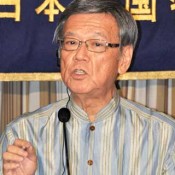
May 21, 2015 Ryukyu Shimpo
Okinawa Governor Takeshi Onaga on May 20 held press conferences at the Japan National Press Club and the Foreign Correspondents’ Club of Japan in Tokyo. “They are using bayonets and bulldozers to forcibly build a military base in the sea,” he said referring to how the governments of Japan and the United States are pushing forward with preparation work for a new U.S. base in Henoko, Nago. The new base is intended to replace U.S. Marine Corps Air Station Futenma. The governor criticized the central government for its heavy-handed approach, comparing it to the way the U.S. military confiscated land to build bases during the U.S. occupation of Okinawa.
Governor Onaga is scheduled to visit the United States from May 27. He said, “I will visit many times, if the situation calls for it.” He also said that he would strengthen Okinawa’s outreach to the United States.
The Governor held the press conferences in Tokyo to convey his message of opposition to Henoko to domestic and international public opinion ahead of his trip to the United States.
Onaga stated, “In theory, the former governor’s landfill approval can legally be withdrawn or cancelled. I will exercise the governor’s authority effectively. Working together with Nago Mayor, I will not allow the U.S. base to be built in Henoko. We can stop it.”
Asked about why he changed his stance from supporting the Henoko relocation to opposing it by reporters at the Japan National Press Club, the governor said, “At the time, then Governor Keiichi Inamine accepted the Henoko relocation plan with conditions such as a new airfield for joint military-civilian use for 15 years. However, then-Prime Minister Junichiro Koizumi discarded [the conditions]. All Japan, including the Liberal-Democratic Party and the Democratic Party, continue to accept the presence of the U.S. bases in Okinawa. We lost 100,000 people during the Battle of Okinawa 70 years ago. We should not pass on the U.S. bases to our children and grandchildren. Conservative politicians who were born in Okinawa should work to protect future generations.”
The Abe administration says that the Henoko relocation is necessary to reduce Okinawa’s burden, in terms of hosting the U.S. forces. The governor pointed out that under the current proposals the US military presence would only be reduced by 0.7% – the closure of all bases south of Kadena would effectively be cancelled out by the construction of new bases elsewhere in the prefecture.
According to the governor, he pointed out to Prime Minister Shinzo Abe at their recent meeting that ‘the base return plan does not appear to be progressing steadily.’
The governor explained the U.S. base issue in detail to the reporters, including how the land was first taken over from the local people for military use. He also criticized the central government for pushing the Henoko relocation, saying, “It is a corruption of Japanese politics.” “All the people should bear responsibility for Japan’s security. They have no backbone, because they press this responsibility on only one prefecture. The Abe administration demonstrates its new concept of ‘proactive pacifism,’, but they are not up to it.”
(English translation by T&CT)
Go to Japanese

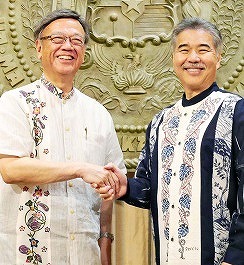

 Harumi Miyagi, historian on women’s issues in Okinawa
Harumi Miyagi, historian on women’s issues in Okinawa Masaaki Gabe, professor at the University of the Ryukyus
Masaaki Gabe, professor at the University of the Ryukyus Jun Shimabukuro, professor at the University of the Ryukyus
Jun Shimabukuro, professor at the University of the Ryukyus Manabu Satou ,Professor at the Okinawa international university
Manabu Satou ,Professor at the Okinawa international university


















 Webcam(Kokusai Street)
Webcam(Kokusai Street)


